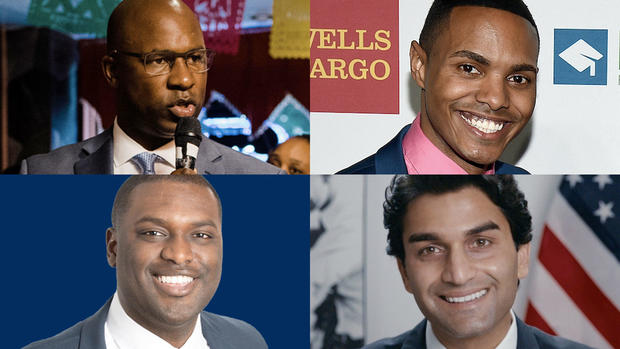Progressive newcomers shake up status quo Democrats in primaries
The surge of progressive candidates of color in congressional primaries this week could be seen as a wakeup call for the Democratic Party, as a new generation signals it's tired of waiting for change.
While final results are still trickling in, Jamal Bowman is claiming victory over New York Representative Eliot Engel, the Foreign Affairs Committee chair who has served in Congress for nearly 30 years. Mondaire Jones and Ritchie Torres are poised to become the first two black, gay members of Congress, replacing lawmakers who are retiring after decades in Washington. Suraj Patel is within striking distance of Oversight Committee Chairwoman Carolyn Maloney. And in Kentucky, Charles Booker has opened up a lead against Amy McGrath, once a star party recruit, in the Senate primary to take on Mitch McConnell.
The upstart successes come after a Democratic presidential primary in which voters delivered the consensus choice of Joe Biden as their nominee from what was the most diverse field in party history. But the political terrain has shifted rapidly over the past few months, with the coronavirus pandemic and police killings both putting a spotlight on systemic racism and inequality in America.
The presidential primary, some activists say, was about finding a candidate best positioned to defeat Donald Trump. But other races on the ballot saw a flurry of activity — Kentucky had record turnout on Tuesday — that doesn't necessarily have much to do with the president. These down-ballot races are more personal; they feature candidates with more obvious ties to the districts and their politics, and they're pressing for action on issues that impact voters' lives right now.
Jones, who won the primary in New York's 17th Congressional District to replace retiring Congresswoman Nita Lowey, described his victory to CBS News as a "mandate."
"I, like so many people in my generation, have been fed up, and we're not waiting our turn. We're not waiting for any local Democratic committee to authorize us to run for Congress, instead we're giving voters a choice," said Jones, who was endorsed by Senator Elizabeth Warren. "No one is entitled to a congressional seat or any other elected office, and in fact, that sense of entitlement has caused us not to make enough progress."
That sentiment was echoed by Congresswoman Alexandria Ocasio-Cortez, who won her primary with more than 70% of the vote after paving the way for others with her upset of longtime incumbent Joe Crowley in 2018.
The political landscape "is fundamentally changing as a new generation uproots the establishment," said Steve Israel, a former congressman who represented Long Island and served as the chairman of the Democratic Congressional Campaign Committee. He told CBS News that the "old rules of waiting your turn" have been "rightfully cast aside" in the era of Donald Trump.
Torres, who ran in the 15th Congressional District to replace Jose Serrano, said the congressional primaries show "we're living in a volatile political moment in which voters are hungering for a new generation of leadership."
On primary night in Kentucky, Charles Booker contextualized the moment: "We're dealing with a pandemic, we're dealing with a height of racial tension on full display, and if we don't stand now it will get worse," he said. "It will be more hashtags, more people will lose their livelihoods, more people who will ration their insulin more people will have the lights cut off; they will lose their home. I'm not trying to scare you, I'm trying to tell you the truth. I'm not going to lie to you like most politicians. I ain't got time."
Just a couple of months ago, Booker was a longshot candidate. National Democrats had lined up behind Amy McGrath, a former fighter pilot who ran for Congress in 2018. Her record-breaking fundraising prowess was attractive to party leaders working to squeeze McConnell. But the killing of Breonna Taylor in Louisville brought issues of police violence to the forefront, and Booker's response contrasted with McGrath's lack of one.
Booker's campaign made the case to CBS News before the primary that while McGrath has better name recognition than Booker, she lacks the committed base of voters he has. The outcome of the Kentucky primary could indicate that money is less important than voter enthusiasm. McGrath raised $41 million, compared to around $790,000 raised by Booker. On Friday, McGrath was fundraising for whomever would be the nominee.
Democrats are cautious about extrapolating too much from Tuesday's results, pointing to nuances of the districts and states. What works in New York won't necessarily translate to other districts the party needs to maintain its hold on the House. Democrats won the majority in 2018 with more moderate candidates in Republican and swing districts. And some of the old rules of politics for candidates — especially spending time in their communities — still hold. Engel, for example, wasn't living in the district, much less the state of New York, and often appeared out of touch with his constituents.
"If you're just sitting back and looking at the energy in these primaries....thinking you can take it for granted, you're building a campaign that could lose," said Israel.
"The issues people cared about were finally being covered," said New York Democratic strategist Rebecca Katz. "We had these candidates....who understood what was happening in the communities because they are from the communities...they are talking about the pain and desperation of the people they are trying to serve."
In an interview with CBS News, Bowman said, "It's clear that people are yearning, urgently yearning for diverse opinions and ideas." Although Engel has not yet conceded the race, Bowman has a significant lead that election analysts say Engel is unlikely to surmount.
Bowman believes voters aren't just craving racial diversity in leadership, but "but diversity of ideas and diversity in terms of how we should do politics as a nation." He added that his base of support was a "diverse coalition," but said it was important to make sure people stayed engaged even after the election is over.
"It's not just about getting people to the polls to vote for us, it's about engaging them consistently in the democratic conversation," Bowman said.
Where political newcomers are seizing on these uncertain times as a means to galvanize enthusiastic voters in their districts, in their view, Biden's place at the top of the ticket is a reflection of the necessary calculus involved in forging an electoral path to the White House.
"There's this traditional notion that top of the ticket drives turnout. But for some folks it's the exact opposite," Cliff Albright, the co-founder of Black Votes Matter, told CBS News. "This is not just the general request for change; it's a specific kind of change."
And another message coming from voters should be that they won't be taken for granted in the presidential election, Albright added. "This energy is not automatic that it shows up in November. It's not automatic that it shows up in the presidential," he said.
Alexandra Rojas, the executive director of Justice Democrats, suggests that supporters of Sanders' and Warren's presidential campaigns were key to some of these progressive candidates' victories, like Bowman's.
"A lot of that energy and excitement came from Bernie and Warren's volunteer base that wanted to continue the political revolution. They maybe weren't as excited about someone like Joe Biden, but this is where the fight is for the long term," Rojas told CBS News.
What progressive leaders recognize with the presidential primary behind them is that Biden is someone with whom they can negotiate and who has already reached out to progressives. A victory for Mr. Trump, however, would mean four more years of "trying to put out fires and save what we have."




